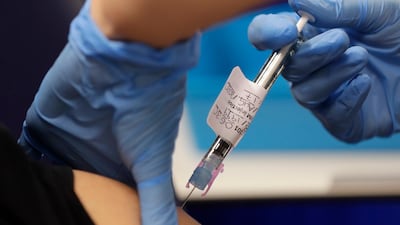A group of 22 organisations has launched a £10 million (Dh47m) project aimed at protecting the world from the next health crisis.
The Trinity Challenge will fund innovations that could improve the world's ability to identify new pathogens, respond to them and recover from pandemics and other global threats.
World-leading universities, including Cambridge and London School of Economics, will work with businesses such as Facebook, GSK and Google, and charities.
Sally Davies, a former chief medical officer in the UK and Emeritus Professor at Imperial College London, said the project would harness the potential of data and analytics to learn lessons from the coronavirus pandemic.
“There will be another Covid-19, and there is an opportunity for the international community to learn lessons now and prepare for the future,” Prof Davies said.
“The Trinity Challenge is a recognition by business, academia and philanthropy of the need for new, breakthrough ideas and approaches to beat the next pandemic.”
Challenge Teams will focus on potential solutions that support and strengthen global public health networks.
Professor Ara Darzi, co-director of ICL’s Institute of Global Health Innovation, said: “Right now, we are facing one of the most formidable challenges of our time that has sent ripples of devastation through communities, health systems and societies all across the world.
“We must ensure that future generations never suffer the same fate again.”
Professor Alice Gast, president of ICL, said the challenge highlighted the power of collaboration.
“While we are living through the most urgent public health crisis in a generation, we have achieved more in the past six months than could ever have been imagined,” she said.
“The pandemic has highlighted the power of collaboration, the strength of our communities, and the importance of thinking beyond geographical borders."
The Trinity Challenge asks participants to submit ideas on how to safeguard the world’s health and economic systems from the threat of global health emergencies.
“The Covid-19 pandemic has shown that the world was not prepared. Together, we all have a responsibility to do everything we can to ensure a pandemic of this magnitude, with this level of disruption to lives and livelihoods, never happens again,” said Tedros Adhanom Ghebreyesus, director-general of the World Health Organisation.


